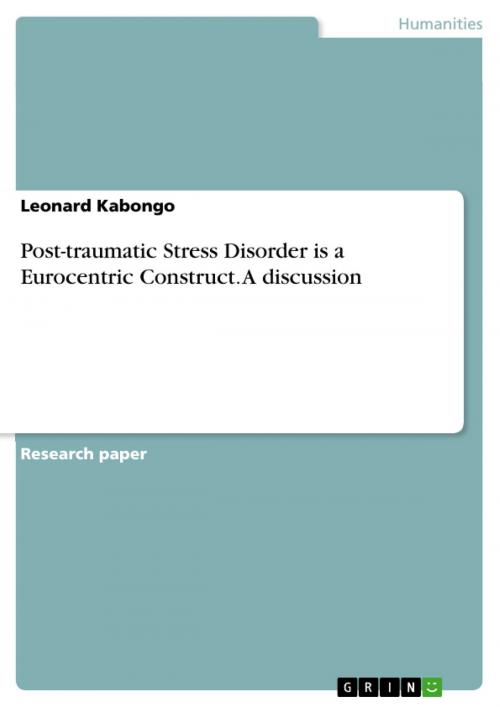Post-traumatic Stress Disorder is a Eurocentric Construct. A discussion
Nonfiction, Health & Well Being, Psychology, Personality| Author: | Leonard Kabongo | ISBN: | 9783668036529 |
| Publisher: | GRIN Verlag | Publication: | August 27, 2015 |
| Imprint: | GRIN Verlag | Language: | English |
| Author: | Leonard Kabongo |
| ISBN: | 9783668036529 |
| Publisher: | GRIN Verlag |
| Publication: | August 27, 2015 |
| Imprint: | GRIN Verlag |
| Language: | English |
Research Paper (undergraduate) from the year 2015 in the subject Psychology - Personality Psychology, grade: B, University of Manchester (HRCI), course: Global Health, language: English, abstract: According to the American Psychiatric Association (2013), Posttraumatic Stress Disorder (PTSD) is defined in the DSMV (Diagnostic and Statistical Manual for Mental Disorders Firth Edition) as a group of psychiatric related symptoms after exposure to actual or threatened death, serious injury, or sexual violence by direct experience, witnessing or distant learning of a traumatic event that occurred to a close person. These symptoms include distressing memories and dreams of the traumatic event, dissociative reactions and marked psychological reactions to internal and external cues that symbolize the event, avoidance of or efforts to avoid distressing memories, thoughts or feelings, negative alterations in cognitions like dissociative amnesia and feeling of detachment, angry outbursts, irritability behavior, recklessness, hypervigilance and sleep disturbance. The diagnosis of PTSD is established when the above mentioned symptoms persist for one month and exhibit clinical manifestations, significant distress of impairment in social and occupational functioning not associated with a substance abuse (alcohol or drug). Introduced in the 1980 in the DSMIII after the Vietnam War, PTSD concept was however not new in the history of Medicine. It has evolved historically from the time of Homer and has been recognized and described for the past century. The holocaust and more recently the American World Trade Center attack has brought into the trauma theory with more publications been released. From its definition in the DSMV, PTSD is viewed as a result of an abrupt, singled traumatic event and its consequences on the human psyche resulting in pschychiatric symptoms as I mentioned above. From this angle, the definition of PTSD is non inclusive expressing an individualized, monoculture and unilateral historic considerations which is argued as a Euro-American culture-bound syndrome that does not apply traditional cultures. On the other hand, for other psychologists and psychiatrists the new concept of PTSD (as defined in the DSMV) is thought to have provided an operational definition applicable for many clinical situations, showed a link between physical pain and psychological event, recognized the extend of a traumatic exposure and more importantly fertilized
Research Paper (undergraduate) from the year 2015 in the subject Psychology - Personality Psychology, grade: B, University of Manchester (HRCI), course: Global Health, language: English, abstract: According to the American Psychiatric Association (2013), Posttraumatic Stress Disorder (PTSD) is defined in the DSMV (Diagnostic and Statistical Manual for Mental Disorders Firth Edition) as a group of psychiatric related symptoms after exposure to actual or threatened death, serious injury, or sexual violence by direct experience, witnessing or distant learning of a traumatic event that occurred to a close person. These symptoms include distressing memories and dreams of the traumatic event, dissociative reactions and marked psychological reactions to internal and external cues that symbolize the event, avoidance of or efforts to avoid distressing memories, thoughts or feelings, negative alterations in cognitions like dissociative amnesia and feeling of detachment, angry outbursts, irritability behavior, recklessness, hypervigilance and sleep disturbance. The diagnosis of PTSD is established when the above mentioned symptoms persist for one month and exhibit clinical manifestations, significant distress of impairment in social and occupational functioning not associated with a substance abuse (alcohol or drug). Introduced in the 1980 in the DSMIII after the Vietnam War, PTSD concept was however not new in the history of Medicine. It has evolved historically from the time of Homer and has been recognized and described for the past century. The holocaust and more recently the American World Trade Center attack has brought into the trauma theory with more publications been released. From its definition in the DSMV, PTSD is viewed as a result of an abrupt, singled traumatic event and its consequences on the human psyche resulting in pschychiatric symptoms as I mentioned above. From this angle, the definition of PTSD is non inclusive expressing an individualized, monoculture and unilateral historic considerations which is argued as a Euro-American culture-bound syndrome that does not apply traditional cultures. On the other hand, for other psychologists and psychiatrists the new concept of PTSD (as defined in the DSMV) is thought to have provided an operational definition applicable for many clinical situations, showed a link between physical pain and psychological event, recognized the extend of a traumatic exposure and more importantly fertilized















